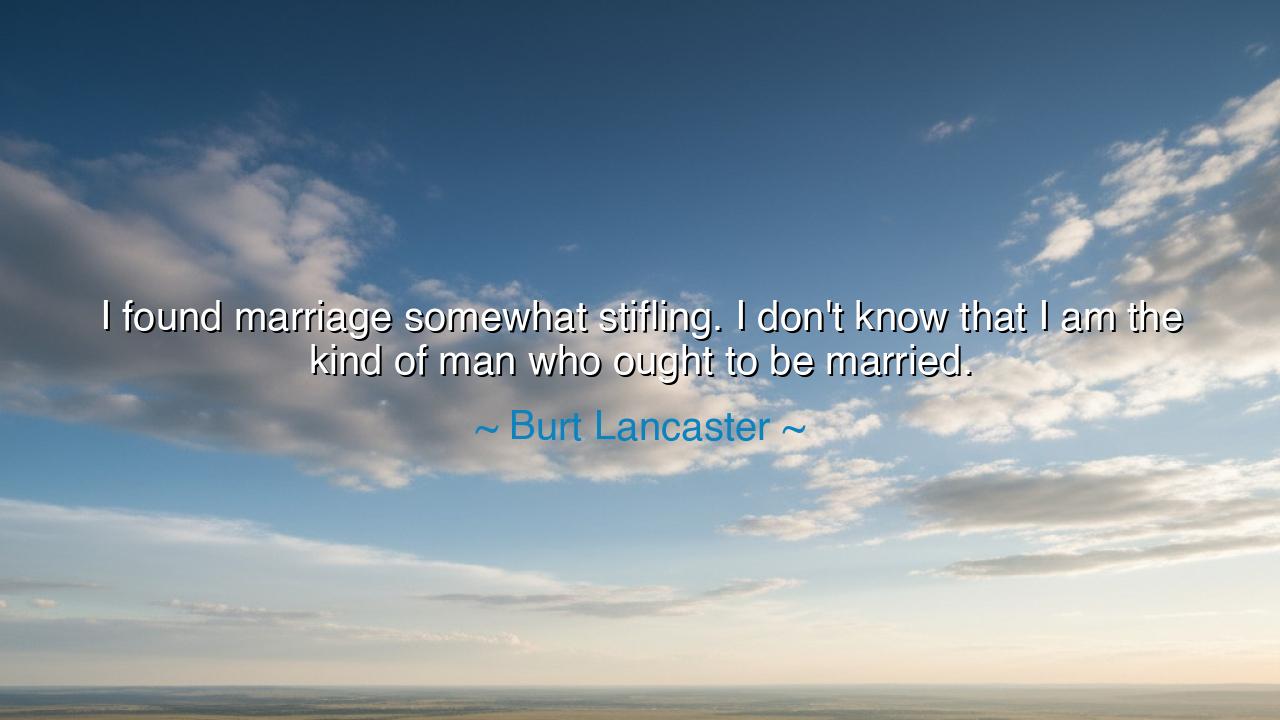
I found marriage somewhat stifling. I don't know that I am the
I found marriage somewhat stifling. I don't know that I am the kind of man who ought to be married.






“I found marriage somewhat stifling. I don’t know that I am the kind of man who ought to be married.” — Thus confessed Burt Lancaster, the silver-haired titan of Hollywood, a man whose life was filled with passion, adventure, and contradiction. His words are not the boast of arrogance nor the dismissal of love, but rather an honest reckoning — a recognition that freedom and commitment often wrestle within the same soul. In this simple admission lies an age-old question: can the spirit that hungers for boundless horizons ever be content within the walls of domestic life?
To understand the meaning of this quote, we must first look upon marriage not merely as a contract of companionship, but as a crucible of transformation. For many, it is a sacred joining, a merging of two destinies into one shared path. Yet for others — the wanderers, the dreamers, the restless hearts — it can feel like a tether upon the wind. Lancaster’s confession reveals that he was a man driven by his own inner fire, one whose freedom was both his gift and his burden. He speaks as one who loved deeply, but who found that the quiet rhythm of married life could not keep pace with the tempest of his nature.
The origin of these words lies not only in Lancaster’s personal story but in the broader truth of human nature. Burt Lancaster was a man of great intensity, known for his commanding presence both on and off the screen. He was a trapeze artist before he was an actor — a man who literally lived by leaping into the air and trusting his strength to catch what others could not. His life was built upon risk and motion, and in many ways, he remained forever that acrobat — soaring through life’s possibilities, unwilling to stay still for long. Thus, when he speaks of marriage as stifling, it is the lament of one whose wings were clipped by the stillness of domestic expectation.
History is rich with figures who have shared this struggle — souls too wild to be confined by convention. Consider the life of Lord Byron, the great Romantic poet who wrote, “I love not man the less, but nature more.” Like Lancaster, Byron was a man of immense passion and boundless energy, yet found himself unable to settle into the harmony of marriage. His union with Lady Annabella Milbanke ended in scandal, for his heart sought adventure over peace, and liberty over domestic comfort. Both men remind us that love is not always enough to bind two souls whose destinies move at different speeds. The lesson is not that marriage fails, but that not all hearts are made for the same rhythm.
Yet beneath Lancaster’s words lies not bitterness, but self-awareness — the rare courage to admit that his path might be different from what society expected. Many live in silence, bound by duties they cannot fulfill, wearing masks of contentment while their spirit withers. Lancaster’s honesty, though tinged with melancholy, is an act of integrity. It reminds us that knowing one’s nature is itself an act of love — both for oneself and for those one might otherwise wound by pretending to be something one is not. True wisdom begins when a person dares to look inward and say, “This life is not for me,” without shame or resentment.
There is also a deeper reflection here about the nature of freedom. Freedom, though beautiful, can be lonely; it asks a price that not all are willing to pay. To walk alone is to forgo the comfort of constant companionship, to exchange safety for solitude. Lancaster’s words capture this paradox: the spirit that longs for freedom often mourns the tenderness it leaves behind. His is not a rejection of love, but an acknowledgment that his love must take another form — in art, in friendship, in the wide-open spaces of self-expression.
So, O seeker, take this wisdom to heart: marriage, like any sacred bond, is not a path for all. To some, it is the garden where their soul blooms; to others, it is a wall that blocks their sunlight. The task is not to judge which is greater, but to know which is true for oneself. Listen to your nature — not to the noise of society or the pressure of expectation, but to the quiet voice within that tells you where you belong. And if you find, as Lancaster did, that your destiny lies beyond the hearth, then walk that road with honesty and grace.
For in the end, the measure of a life is not in how closely one conforms, but in how truly one lives. As Burt Lancaster teaches through his confession, to know oneself — to love one’s freedom even when it isolates — is a kind of nobility. And though marriage may not have been his calling, his truth stands eternal: that every soul must find the form of love and life that allows it to breathe, to burn, and to be free.






AAdministratorAdministrator
Welcome, honored guests. Please leave a comment, we will respond soon